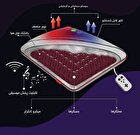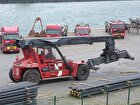Iranian Startup Produces Anti-Fouling Paints Meeting Environmental Protection Standards

Nanofan Shafaq is an Iranian startup that has succeeded in producing anti-fouling paints with nanomaterial-based biocides content meeting environmental protection standards.
Nanomaterial-based biocides have effective antimicrobial properties against different waterborne microorganisms while posing fewer environmental impacts.
Anti-fouling is the process of removing or preventing the accumulation of marine organisms from the surface of the hull and the paint used for this application is called anti-fouling paint.
Anti-fouling paints are used to coat the bottoms of ships to prevent sealife such as algae and mollusks attaching themselves to the hull – thereby slowing down the ship and increasing fuel consumption.
Today, there are various methods to produce anti-fouling paints, but researchers are always looking for a method that would make the paint of the ship's hull more effective in addition to being adaptable to the environment.
For this purpose, the startup has taken valuable steps in this field and has been able to use a nano-based compound that destroys plant and animal microorganisms in the production of anti-fouling paints.
Shipping companies and manufacturers of anti-fouling paints are the main customers of the product.
The company’s anti-fouling nano-biocide replaces foreign products that are difficult to import into the country due to sanctions.
In comparison with foreign-made rivals, the Iranian product can significantly reduce fuel consumption due to the hydrodynamic effects it has on the ship.
Anti-fouling paints are highly used in construction, shipbuilding, and oil and petrochemical industries.
Iran currently ranks 4th in the world in the production of nano-science. This comes as part of Iran's Nanotechnology Initiative Council’s first development plan, which has sought to advance nano-science in the country.
The second 10-year plan, which started in 2015, seeks to move nano-science from paper to the industry. In the meantime, the Nanotechnology Initiative Council is working on a third plan to trade Iranian nano-products in the global market.
Currently, nanotech products are produced and marketed in more than 15 industrial fields based on domestic technologies and are being exported to 49 countries from five continents.
4155/g





















